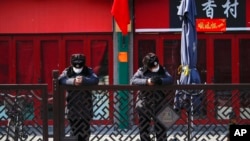From Afghanistan to France, Chinese people have been attacked and even killed while living abroad. As security threats to Chinese companies, citizens, projects and investments along the Belt and Road development initiative continue, Chinese companies that used to hire local or Western private security companies have switched to employing more Chinese private security companies, experts said.
Niva Yau, researcher at the OSCE Academy in Bishkek, Kyrgyzstan, told VOA that China's military reform in 2016 "pushed a lot of former military personnel into the private security sector."
As a result, according to Yau, Chinese private security companies in recent years are expanding to other countries along China's Belt and Road Initiative (BRI), which builds infrastructure projects in Asia and Europe.
As Chinese investments overseas have increased, so has the footprint of Chinese private security companies, making it a multibillion RMB industry.
Yau said that Chinese companies in the BRI are "vulnerable in most of the participating countries where there is higher anti-China sentiment."
"Private security is definitely needed as a practical measure," Yau said. "But the choice to hire Chinese ones is a top-down decision from Beijing to keep its security business handled on its own without interference of third countries."
According to Yau, one factor is language and the ability to communicate between the security and company staff. Another reason is trust: whether the guards will take the Chinese side or the local people's when a conflict occurs.
How Chinese private security companies behave abroad is also changing, influenced by decision-makers in Beijing and the local tolerance of them, Yau added.
"In Kyrgyzstan, for example, they went from being quite high profile in advertising their services to becoming more low key due to public discussion about their work," Yau said. "In Kazakhstan, they have always had a low profile due to high sensitivity and distrust amongst locals."
Early Chinese private security
The first Chinese private security companies have been around at least since the 1990s and have grown since then, according to a report by the Jamestown Foundation.
In 2009, Beijing legalized Chinese private security companies by introducing a law called "Regulation on the Administration of Security and Guarding Services," which allowed the companies to use arms in some of their services.
Now, 5,200 Chinese private security companies employ more than 4 million security staff, mostly Chinese People's Liberation Army veterans. Some 20 to 30 of these companies operate in BRI countries across South and Central Asia, the Middle East and Africa.
Chinese private security companies account for about 10% of the orders from Chinese companies operating overseas, according to a Zhejiang University report.
"Huge amounts of security expenses have flowed out to Western security companies," the 2019 report said.
According to Emil Avdaliani, director of Middle East Studies at the think tank Geocase, based in the country of Georgia, China has relied on private security companies in the past, but the companies' scope of activities and geographic expanse were limited.
"Threats to Chinese assets and nationals, too, were limited," Avdaliani told VOA. "Evacuation operations of Chinese nationals from Libya and Yemen were two cases that made Beijing look at potential threats which would be arising in the future."
In 2011 and 2015, Beijing used the Chinese People's Liberation Army to evacuate Chinese citizens from Libya and Yemen.
"Massive" Chinese international economic involvement since President Xi Jinping's launch of BRI in 2013 and recent attacks against Chinese workers overseas pushed Beijing to reconsider expanding internationally the role of Chinese private security companies, which operate mainly inside China, according to Avdaliani.
"Recent attacks against Chinese workers in Pakistan and Kyrgyzstan are just a small number of cases from the last several years," Avdaliani said.
"Therefore, it is likely that (private security companies') rights to operate abroad with arms (will) be expanded to respond to various challenges."
Chinese private security companies abroad are also a good tool for Beijing to better position itself in the "ongoing great power competition" with the U.S., Avdaliani added.
"The companies will enable Beijing to take and hold initiative in the time when direct military clashes are rare," Avdaliani told VOA.
















